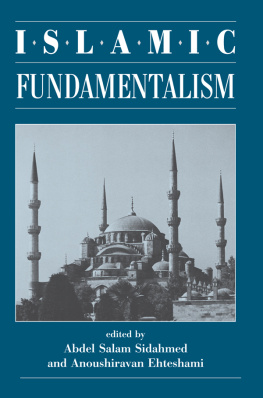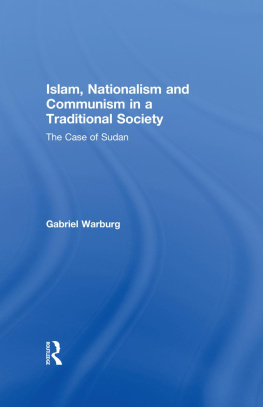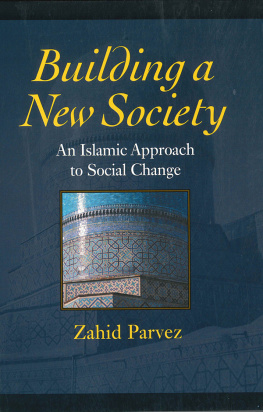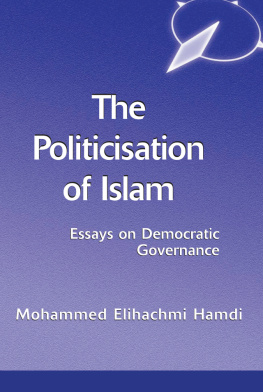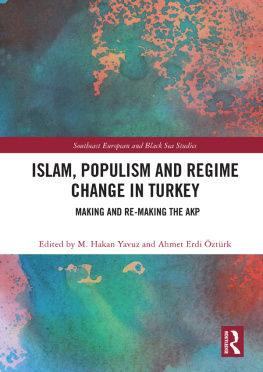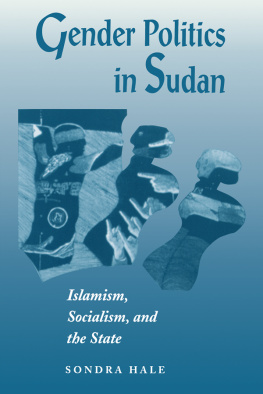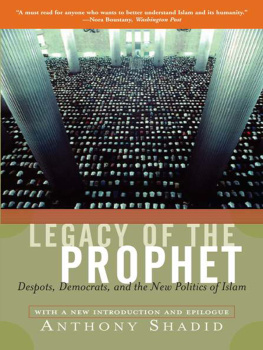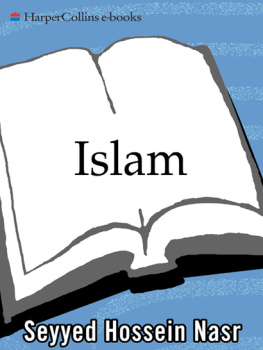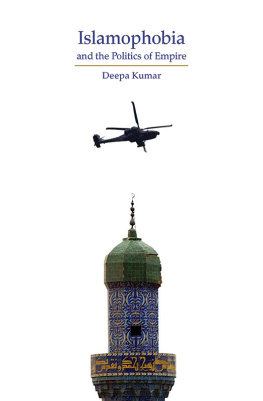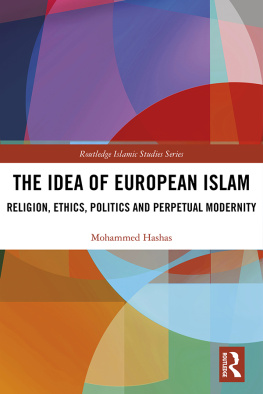Politics and Islam in Contemporary Sudan
First published in 1997
By Routledge
Reprinted 2004
By Routledge
2 Park Square, Milton Park, Abingdon, Oxon, OX14 4RN
Transferred to Digital Printing 2007
Routledge is an imprint of the Taylor & Francis Group
1997 Abdel Salam Sidahmed
Typeset in Sabon by LaserScript, Mitcham, Surrey
All rights reserved. No part of this book may be reprinted or reproduced or utilised in any form or by any electronic, mechanical, or other means, now known or hereafter invented, including photocopying and recording, or in any information storage or retrieval system, without permission in writing from the publishers.
British Library Cataloguing in Publication Data
A catalogue record for this book is available from the British Library
ISBN 0-7007-0409-4
Publishers Note
The publisher has gone to great lengths to ensure the quality of this reprint but points out that some imperfections in the original may be apparent
To Sahar, Asil and Mazin who bore the brunt of my solitude.
No specialised system of transliteration is being followed in this book. Place names follow the most common spellings. Arabic words and terms are normally italicised without diacritic marks except for the ayn () and the hatnza ().
When Sudan appears in international media, it is mostly on account of its 13 year-long civil war and related disasters. Occasionally, reference is made to the ideological orientation of the present Sudanese regime and its fundamentalist leaning. Thus labelled, Sudan is viewed as one among few countries which are supposedly engaged in a process of radical Islamicisation of state and society.
The Sudanese case, however, is rather peculiar because neither its earlier history, nor the present composition of its society necessarily suggests its current image and actual state of affairs. In the first place Sudan was comparatively a late convert to Islam (later even than the Islamised West African societies), and as such had witnessed a different process through which Islam has become associated with its political and ideological discourses. Secondly, there are the reality and complexity of todays Sudan as a multi ethnic, and multi-cultural society with a sizable non-Muslim community. Yet, these historical and sociological considerations notwithstanding, the Sudanese politics (in the past as in the present) has been characterised by its curious fusion with Islamic religion.
The mainstream political parties National Unionist Party (NUP) and Umma party both of which appeared in the 1940s, were essentially founded on the basis of the influence of the major religious sects, the Ansar and Khatmiyya, who divide the loyalties of the majority of Sudanese Muslims. After Sudans independence in 1956, and particularly in the mid-1960s the call and pressure for the adoption of an Islamic constitution became an issue of central political controversy which dominated the politics of the period in question. In the early 1980s the regime of Jafar Nimeiri (19691985) embarked on an Islamicisation experiment (of laws, whereby the Islamic sharia sanctions became incorporated in the penal code), and Nimeiri attempted to establish himself as a religious, as well as political leader. In 1989, yet another military coup brought an Islamist party, The National Islamic Front (NIF), to power a development that was designed to trigger a full swing of Islamicisation of politics, law and society.
This book approaches its subject through an assessment of the evolution of Sudanese contemporary politics in a chronological order. Due emphasis will be given to assessing the contextual framework of the formation and transformation of the socio-political forces which constitute the major contenders for political power in contemporary Sudan. The rise and development of Islamist politics and ideology, however, remain the central themes.
I am most grateful to the Society for the Protection of Science and Learning whose kind grant in 1994 enabled me to devote time and resources for research and writing of parts of this book. My thanks are due also to my friends and colleagues Khalid al-Mubarak and Muhammad Mahmoud who read and commented on some chapters of the manuscript, and to Yohannes Akol, Abdel Salam Hasan, and Ordesse al-Zubair who have kindly shared with me their time and information during my research into certain issues and periods.
Throughout its contemporary history, the Sudan has experienced various regimes that have fluctuated between military dictatorial, totalitarian systems and civilian parliamentary ones. The period related to this study covers three parliamentary regimes (from 1953 to 1958, 1965 to 1969, and 1986 to 1989) and three military ones (from 1958 to 1964, 1969 to 1985, and 1989 to the present). In all these governmental systems the Islamic factor figured significantly, either in a latent manner, as in the sectarian loyalties that lent the mainstream parties their power bases, or in an expressed manner as in the various experiments of Islamic constitutions and legislation. The experiments in drafting an Islamic constitution in 1968, and enacting Islamic sharia laws in 1983 and 1991; the execution of a religious reformist leader Mahmud Muhammad Taha in 1985 on charges of apostasy; and the rise of an Islamist party to power (the Islamic National Front) in 1989, are all but conspicuous cases in the above-mentioned process.
The underlining factor behind this process is the controversy surrounding the role of Islam in Sudanese politics and public affairs in general. The debate has been between Islamists who regard the role of Islam as extending beyond individual religious commitments in terms of human-God relationships to regulate and administer societys affairs (human-human relationship); and secularists who, in broad terms, call for a separation between religion and politics. On another level, the debate has also been between Islamists themselves who hold different, sometimes conflicting, views with regard to the nature of a projected Islamic state, and differ also as to the content of Islamic law and its applicability to modern conditions.
A comprehensive scheme of investigation in this debate has to look into the complex relationships among Islam as a religion, Islamism as an ideology and Sudanese society and politics as the contextual framework.
I
In approaching the question of Islamic religion in general it may be useful to start by stating the obvious: Islam is the religion which historically appeared in 7th-century Arabia advocated by the Prophet Muhammad Ibn Abdallah (570632/33 AD) and spread from there. Today it represents the religion of the majority in many countries in the Middle East, North Africa and Asia.
Essentially, the basic and most fundamental teachings of Islam are that God is one and there is no god save Him; that Muhammad Ibn Abdallah is His messenger; that every Muslim is required to perform five prayers a day and to fast during a particular month Ramadan; to pay the annual zakat (alms-in-tax) out of his/her property or regular earnings; and to undertake hajj (pilgrimage) to Makka at least once in his/her life if he/she can afford it. These are called the five pillars of Islam. Furthermore, a Muslim is required to believe in God, His messengers, the Holy Scriptures, the Angels, Destiny, and the Day of judgement. As in other religions Islam requires that its adherents observe a strict code of ethics in their personal behaviour and in their conduct with their community, and co-religionists not to lie, steal, drink alcohol or fornicate, and to act kindly and considerately to other members of the community.


